

Social networking service. A social networking service (also social networking site or SNS) is a platform to build social networks or social relations among people who share interests, activities, backgrounds or real-life connections.
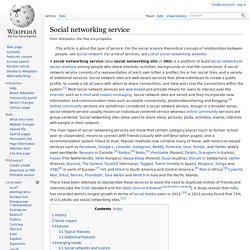
A social network service consists of a representation of each user (often a profile), his or her social links, and a variety of additional services. Social network sites are web-based services that allow individuals to create a public profile, to create a list of users with whom to share connections, and view and cross the connections within the system.[1] Most social network services are web-based and provide means for users to interact over the Internet, such as e-mail and instant messaging.
§History[edit] The most popular social networking sites by country Early social networking on the World Wide Web began in the form of generalized online communities such as Theglobe.com (1995),[15] Geocities (1994) and Tripod.com (1995). Wiki law project. Template:Uw-puf-remove. Please do not remove the {{puf}} template from files.
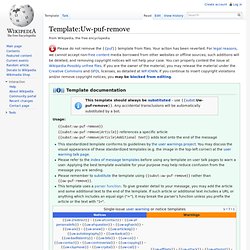
Your action has been reverted. For legal reasons, we cannot accept non-free content media borrowed from other websites or offline sources; such additions will be deleted, and removing copyright notices will not help your case. You can properly contest the issue at Wikipedia:Possibly unfree files. If you are the owner of the material, you may release the material under the Creative Commons and GFDL licenses, as detailed at WP:IOWN. If you continue to insert copyright violations and/or remove copyright notices, you may be blocked from editing. Revision deletion. WP:REVDEL redirects here.
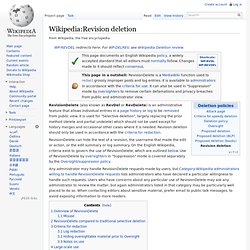
For WP:DELREV, see Wikipedia:Deletion review. RevisionDelete (also known as RevDel or RevDelete) is an administrative feature that allows individual entries in a page history or log to be removed from public view. It is used for "Selective deletion", largely replacing the prior method (delete and partial undelete) which should not be used except for history merges and occasional other cases where it is needed. Revision deletion should only be used in accordance with the criteria for redaction. RevisionDelete can hide the text of a revision, the username that made the edit or action, or the edit summary or log summary. Citing sources. A citation, or reference, uniquely identifies a source of information: Ritter, Ron.
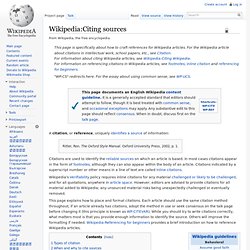
The Oxford Style Manual. Oxford University Press, 2002, p. 1. Citations are used to identify the reliable sources on which an article is based. In most cases citations appear in the form of footnotes, although they can also appear within the body of an article. Wikipedia's Verifiability policy requires inline citations for any material challenged or likely to be challenged, and for all quotations, anywhere in article space. This page explains how to place and format citations. Types of citation. Conflict of interest. Conflict of interest (COI) editing involves contributing to Wikipedia about yourself, family, friends, clients, employers, or your financial and other relationships.
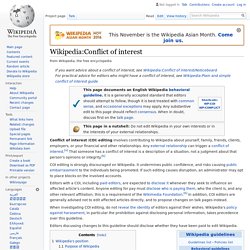
Any external relationship can trigger a conflict of interest. [a] That someone has a conflict of interest is a description of a situation, not a judgment about that person's opinions or integrity. [b] COI editing is strongly discouraged on Wikipedia. It undermines public confidence, and risks causing public embarrassment to the individuals being promoted. Editors with a COI, including paid editors, are expected to disclose it whenever they seek to influence an affected article's content. When investigating COI editing, do not reveal the identity of editors against their wishes. Editors discussing changes to this guideline should disclose whether they have been paid to edit Wikipedia.
Category:Connected contributors. Contributors to Wikipedia who are covered by, or significantly related to, an article on Wikipedia.
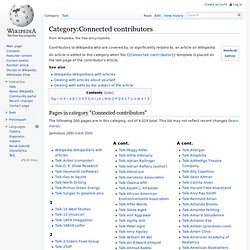
An article is added to this category when the {{Connected contributor}} template is placed on the talk page of the contributor's article. Template:Connected contributor. Usage.
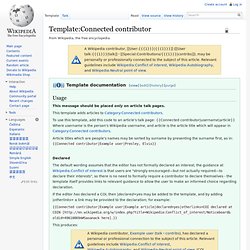
Template talk:Connected contributor/Archive 1. Objections A similar attribution, category:Wikipedians with article, was nominated for deletion May 16, 2005 and deleted a week later.
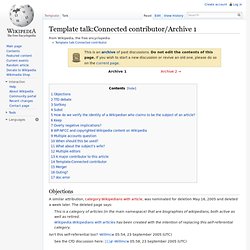
The deleted page says: This is a category of articles (in the main namespace) that are biographies of wikipedians, both active as well as retired. Wikipedia:Wikipedians with articles has been created with the intention of replacing this self-referential category. Isn't this self-referential too? See the CfD discussion here: [1] -Willmcw 05:58, 23 September 2005 (UTC) TfD debate. TestTemplates. This category is for test templates: used to inform or warn a (usually new) user where they have made a test or other apparently good faith but inappropriate edit to a project page.
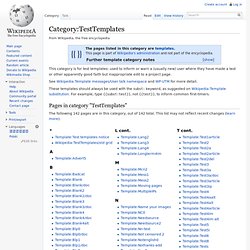
See Wikipedia:Template messages/User talk namespace and WP:UTM for more detail. The following 142 pages are in this category, out of 142 total. Template:Uw-coi. Hello, Uw-coi.
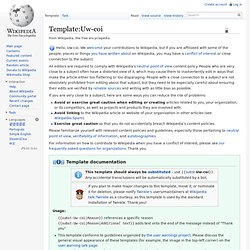
We welcome your contributions to Wikipedia, but if you are affiliated with some of the people, places or things you have written about on Wikipedia, you may have a conflict of interest or close connection to the subject. All editors are required to comply with Wikipedia's neutral point of view content policy. People who are very close to a subject often have a distorted view of it, which may cause them to inadvertently edit in ways that make the article either too flattering or too disparaging. Standardised user warning templates. Templates in this category are created by the WikiProject on User Warnings.
Please do not add any templates to this category unless they were designed by this WikiProject. Sort key: * (Help pages, WikiProject, et cetera), Redirect, Template. Category:User warning templates. This category includes all of the user warning templates. Some of these templates are used by a large number of editors and admins involved in user disputes, so changes to them should be made with care. In general, these templates should be placed on a user's talk page. Subcategories This category has the following 7 subcategories, out of 7 total. Category:CSD warning templates. Talk:Template messages/User talk namespace. Misleading documentation[edit] "This is your last warning", when not really the last warning, makes us appear weak[edit] {{uw4}} and the level-4 user warning templates tend to start with "This is your last warning.
" But, as User:A. B. points out,[1] some users have gotten multiple "last warnings" not yet followed by any block. Threatening "this is your last warning", without actually following through, makes us sound weak and makes all our threats sound empty. Therefore, I propose that we should change the phrase "This is your last warning. " to something equally threatening but which is less binding upon us. Template:Db-attack-notice. April 2014 Please do not create pages that attack, threaten, or disparage their subject.
General sanctions. General sanctions are a tool used by the community or the Arbitration Committee to improve the editing atmosphere of an article or topic area. When general sanctions are employed, they are specifically detailed instructions by which community consensus or Arbcom motion has empowered administrators to act single-handedly to sanction editors who are not complying with general behavioral or editorial guidelines and policies. Types of sanctions[edit] Talk:Template messages/User talk namespace. WikiProject user warnings. Template messages/User talk namespace. Multi-level templates[edit] Citing sources. This page is specifically about how to craft references for Wikipedia articles. For the Wikipedia article about citations in intellectual work, school papers, etc., see Citation. Namespaces.